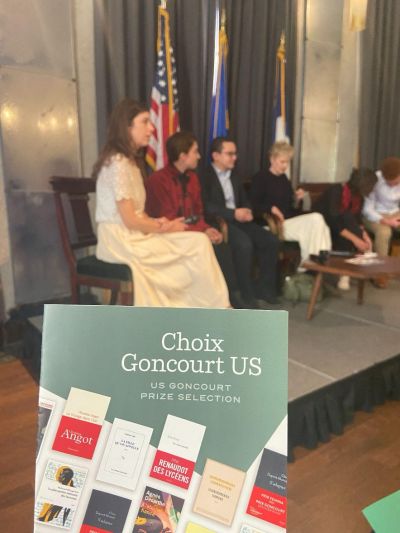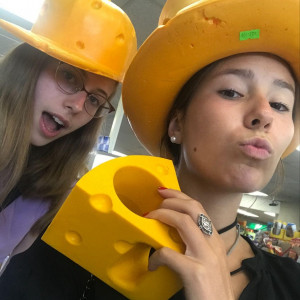Grace Kurtz-Nelson

In this series of four stories, we are highlighting students whose “Why I Learn Languages” essays have been selected as winners of the Trinity Language Council’s 2024 Best Essay competition. Grace Kurtz-Nelson is a senior majoring in Public Policy and French. Through her time at Duke, she deepened her knowledge of French and started Italian. Read and let Kurtz-Nelson tell you, in her own words, how learning languages helped her make life-long friends while she laid the tracks of her future career.
Sitting at a wooden table eating seafood, I watched over a hundred family members from France converse, eat and frolic. I was 14 years old, attending a family reunion with Estelle, my pen pal from the south of France. Seven years later, I still remember how it felt to dip my feet in the reflection pool on a hot summer day in Toulon and let my broken French take me through conversations with Estelle’s cousins. My adventurous eating habits and hearty laugh came to good use; an onlooker might even think I was part of the family if they didn’t hear my American accent or grammar mistakes.
A student of French since the age of five, I have always loved practicing my second language. I was quickly drawn into French immersion experiences, which is how I met Estelle. We were pen pals in seventh grade and we put copious amounts of effort into our letters, including pictures and drawings. Our first meeting in person was in the parking lot at her middle school in a suburb of Toulouse. I felt jittery as I got into her mom’s car and spoke French for the first time with native speakers. It took significant effort, but I participated in the dinner table conversation and started to get to know Estelle’s family. The gratification of using the language skills I had built in the classroom was addicting.
A year later, at Estelle’s vacation home in southern France, I remember dreaming in French for the first time. I woke up and my first thought was in French. Spending two weeks in a tiny town in Provence, I had no choice but to start living in French, as many store merchants in the village did not speak a word of English. I felt empowered to learn more as I tackled new settings: restaurants, farmer’s markets, the dinner table. That summer I truly began to feel that French was a special part of my identity and a tool I could use to discover new worlds.

When I started at Duke, I intended to take a few French classes and become a French minor, but I was soon enamored by the French course offerings and added French as a second major. In French for Current Affairs, I learned how to analyze the French religious and political landscapes. In Reading French Literature for the Prix Goncourt, I was the only delegate at the U.S. version of a French literary prize convention that did not go to French school. In Global Displacement: Voix Francs, I learned about the challenges of refugee services and asylum processes in francophone countries. These classes offered me new perspectives and worldviews, while enriching my political, literary and cultural capabilities.
Since middle school, it was my dream to study at Sciences Po in Paris, and last semester I achieved this goal. I navigated classes in French, studied in an education system completely different from my own and felt like a freshman again, except this time as I met new people I didn’t know whether to introduce myself in English or French. My public speaking skills and confidence skyrocketed as I gave several presentations in French in front of mostly native speakers. I met my best friend abroad, a girl from rural Bavaria, during Sciences Po orientation. Our upbringings could not have been more different, but both of our high school French teachers used Stromae songs to teach vocabulary lessons and inspired our love of French music. I also met two wonderful Italian friends at Sciences Po, which inspired me to take Italian this fall.

My French-speaking friends tell me that my voice changes pitch and my sense of humor becomes more sarcastic when I speak French. When speaking with older generations, I try my best to conform to traditional French manners and use the formal “you.” In settings with people my age, I throw around French slang.
Being a French speaker has given me insights about Africa I otherwise would not have. In a Zoom conversation with a man who migrated from the Democratic Republic of the Congo to Uganda, I learned that many Ugandans are grateful for China’s infrastructure projects in their country. This summer, I met an Uber deliverer from Burkina Faso, who told me that he supports the country’s military ruler Ibrahim Traore and is hopeful that Traore will quell extremism there. As someone pursuing a career in foreign policy, it is important for me to understand perspectives like these about the francophone world that are not covered by Western media.
During my time at Duke, I have interned with the State Department and Council on Foreign Relations researching francophone media to analyze political sentiment and news perspectives in Africa. Whether it is learning how Cameroonian youth make fun of 91-year-old president Paul Biya (they claim he rules from Switzerland), reading perspectives on Senegal’s new oil deal or explaining the Alliance of Sahel States’ perspectives on the war in Ukraine, my ability to read French has improved my knowledge of the francophone world. My skills have begun to make an impact, as I have helped American institutions make more informed decisions on African foreign policy.
As my time at Duke concludes, I plan to maximize my language experience on campus by taking courses in both French and Italian. This semester, I am taking classes on francophone literature in the Indian Ocean region and Elementary Italian. Later this year, Estelle will visit Duke to experience American college life, where we will be sitting at a different kind of wooden table, the ones in West Union. I don’t know if the seafood will be quite as good, but the conversation – whether in English or French – will be spectacular.
